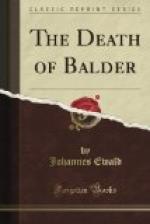EXPLANATION OF THE MYTHOLOGICAL WORDS AND NAMES.
Allfather was one of Odin’s surnames, but it signifies in this piece the highest being, who governs all things, and Odin himself.
Alf, a spirit; the same as Demon amongst the Greeks. There were good and bad Alf’s or Elves, light and black, as the Edda calls them.
Aser, was one of Odin’s surnames, and on that account the name of Aser was given to all the gods.
Asgard, the castle or city of the gods, erected by Odin and his brothers.
The fall of asgard. At the end of the world the heavens were to burst, and the castle of the gods to fall.
Balder, son of Odin and Frigga, the best and most beautiful amongst the Aser. His death and the circumstances which caused it in this piece—that is, the whole plot—are taken partly from the Edda (43rd, 44th and 45th falle), partly from the third book of Saxo, and something is, according to poetic license, added or altered.
Fenri’s wolf, was begot by Loke with the giantess Angerbode. This wolf in the conflict of Surtur with the gods was to swallow Odin, who on account of this prophecy kept him in chains.
Fight and death of gods. At the destruction of the world, Odin and the other gods were to fight with Surtur and his train, and all to perish in this conflict. This period is termed, in the Edda, Ragnarokr, the “twilight of the gods.”
Find, a Trold or Demon of this name.
Freya, the most exalted of the goddesses next to Frigga. She was the protectress of the human race in general, but particularly of lovers.
Frigga, the wife of Odin and the mother of Balder; the most exalted of all the goddesses.
Gelder, king of the Saxons (according to Saxo, in the life of Hother). He is presumed here to have been killed by Hother, who is therefore called “the bane of Gelder.”
Gevar, according to Saxo, a spaeman or prophet, the father of Nanna and the foster-father of Hother. He makes him likewise king of Norway; but Giver is not so in this piece.
Hael or Haela, the goddess of death. She was the daughter of Loke and the giantess Angerbode, and was hurled down by Odin to her horrible habitation.
Haelheim, Hael’s dwelling. In the Edda it is called Helim, that is, Hell; but as the word Hell has now a different signification, it was necessary to invent here a word to express Hael’s dwelling.
HAELWAY, the way of the dead, or the path to Haelheim.
HERTE, Herta, or Hertha, the earth, considered as a divine being and worshipped as a goddess by the old German and Northern people, as likewise by the Romans and others. The Edda calls this goddess Jord (that is, earth), and makes her the daughter and wife of Odin, and the mother of Thor, his first son.




